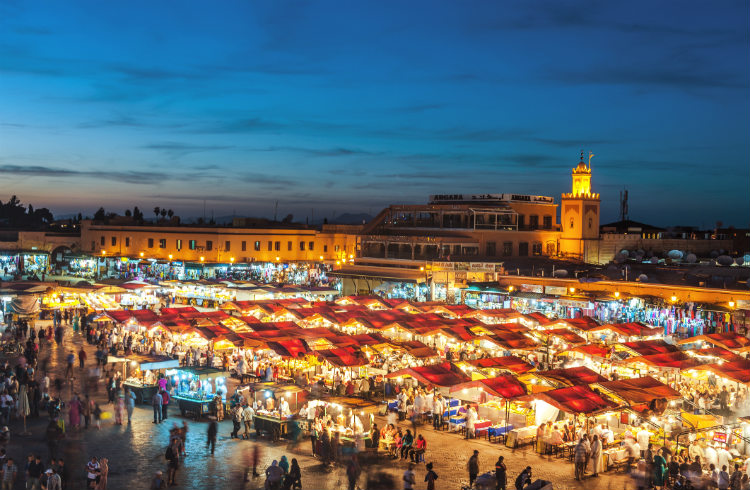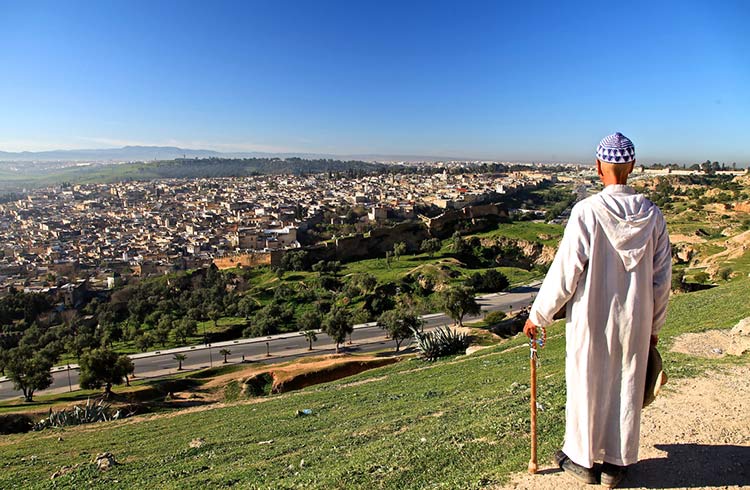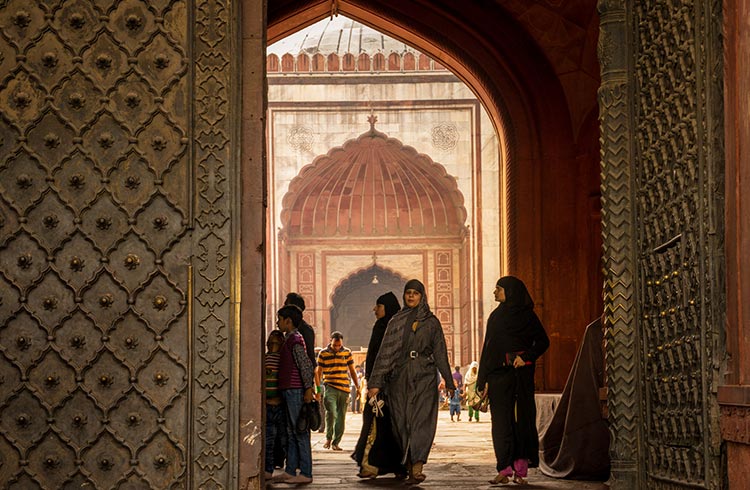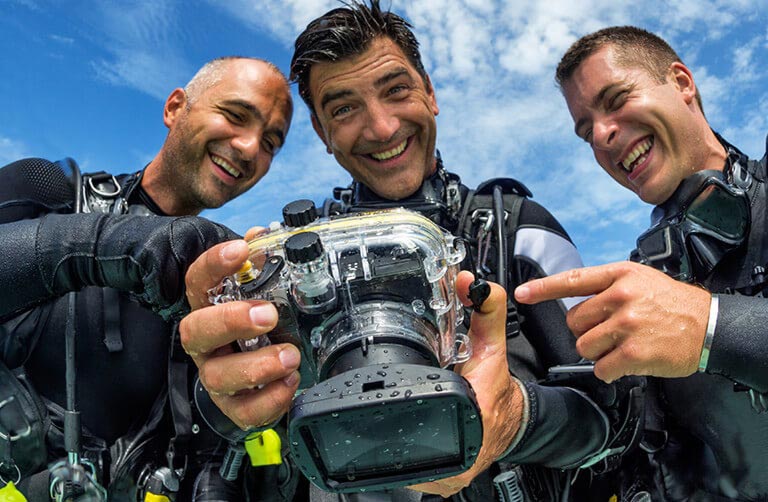How to Travel Safely in Morocco's Souks and Medinas
Morocco's markets are a colorful, and often confusing, maze of alleys, shops, and craftspeople. Here's how to navigate them safely.
 Photo © Getty Images/Pavliha
Photo © Getty Images/Pavliha
The old medinas of Moroccan cities are labyrinths of wonders, and crowded souks can feel like a bizarro version of Times Square. Before you dive in and get splendidly lost, here are some tips for staying safe.
- What is a medina? What is a souk?
- Safety concerns in the medina
- Navigating the medina after dark
- How to avoid getting lost
- Safety for women
- Medina etiquette
What is a medina? What is a souk?
”Medina” means city in Arabic, and in Moroccan cities it refers to the historic old town, with narrow, winding streets and alleys enclosed within a stone wall, accessible via various gates, or babs (doors). Cars usually don’t enter these areas, although motorcycles, bicycles, and even donkey carts abound, and they’re a true labyrinth to navigate.
“Souk” simply means market. Sometimes the word refers to a part of the medina where a particular product can be found – the spice and carpet souks of the Marrakech medina, for example. In any given city, you’ll also find many large open-air souks outside of the medina. In this case you can expect hundreds of merchants with tables set up in the middle of the street.
Safety concerns in the medina
In both souks and medinas, the biggest hazards are scooters and motorcycles. Drivers are used to pedestrians jumping out of the way, and don’t slow down even in the most crowded spots, so don’t wear headphones, otherwise you won’t hear them coming.
As Moroccans will probably tell you when you arrive, the other danger to watch out for, as in any crowded place, are pickpockets. Don’t hang walk around with your phone in your hand, and consider putting it on a lanyard so that it can’t be expertly fished out of your pocket while you’re engrossed in a pile of wares. Same goes for your wallet – don’t keep it in a back pocket, where thieves can nab it without you realizing. Keep your eye on your bag or purse, and if you’re entering a jam-packed street or alley, it’s probably best to wear your backpack in front of you, even though you’ll look silly.
If you do get mugged or pickpocketed, lock your phone right away, freeze all credit and bank cards, and go straight to the police and make a statement. If you’re lucky, you might even get your phone back; police in Marrakech have been known to track down and recover stolen phones.
Navigating the medina after dark
In most medinas, you’ll be constantly surrounded by other shoppers (both Moroccans and tourists), as well as shopkeepers, so if you’ve got your phone and wallet in a safe place and are canny to the roar of an oncoming moped, you can relax and shop. But as in any large city, when if you stray off the beaten path and into a deserted alley, you might become a target for a mugger. As you might imagine, the best thing to do is to stick to well-trafficked streets where you see other shoppers – and that’s where all the shops are, anyways.
The old medinas of Fes, Tangier, Rabat, Tetouan, Marrakech, and Essaouira tend to be lively places after dark, with tourists and locals continuing to shop, eat, and promenade into the wee hours. Again, as long as you stick to well-trafficked streets, you should be fine. The old medina of Casablanca has a (not entirely deserved) reputation even among Casaouis for being dangerous, and there’s not really anything to do there late at night, so it’s best avoided.
How to avoid getting lost
The other thing to watch out for is not a danger so much as an annoyance: getting lost. Medinas are true labyrinths, and it’s hard to find your way. Hotels usually provide maps. Sometimes map applications work even if you don’t have data, as long as you have geolocation turned on. Ideally, download the area you’ll be navigating into your saved “offline maps” while you’re on the hotel wifi, mark the hotel and other destinations with a pin, and then follow the blue dot. (Another reason to have a lanyard for your phone, so that it can’t be yanked out of your hand.)
If you do have to ask for directions, ask a shopkeeper, who can’t leave his or her shop. But under no circumstances accept the offer of someone in the street to walk you to your destination. While you’re likely to be helped, treated to tea or a meal, or even hosted for free in smaller towns in Morocco, mass tourism has created an ugly reality in some old medinas, especially Marrakech. Development of tourist lodgings have sent rent prices sky high, driving out residents and small businesses like butchers and tailors from neighborhoods, until all that’s left is a hollow facade and an ecosystem consisting of hotels and guesthouses, restaurants, souvenir shops, and tourists – and people who, left with few other options, try to prey on those tourists.
In the medina, especially in Marrakech, and especially if you’re first arriving at your hotel and are seen with bags, you’re likely to be approached by someone who will ask you where you’re staying and try to show you the way. Be polite but firm about not accepting their help.
Most cities have licensed guides who will provide a comprehensive tour of the historic areas around the medina and souks for a reasonable rate, and many have built up relationships with the local community which helps visitors engage with the locals. These guides will take you to specific shops and will often have good advice on what to buy. There is no obligation for you to make a purchase, but know that if you do, your guide will be getting a cut.
Safety for women
Depending on where you are in Morocco, you’ll see women dressed in anything from a full burqa to a tube top and short-shorts. Dressing more modestly might get you slightly less attention, but this will not stop all catcalling; even women dressed in burqas have been known to be harassed on the street. If a man verbally harasses you, completely ignoring them usually makes them lose interest. But if they continue talking to you or follow you, don’t be polite – tell the person firmly to leave you alone, and if they don’t get the message, tell him you’ll go to the police, or shout if you need to. As is true in any country in the world, there’s no need to be polite to harassers. It’s best to be clear and loud with your boundaries.
Medina etiquette
As you walk through the old medina of Marrakech, you’ll hear a lot of people trying to get your attention with a shout of “hello” in the language they think you speak, or even with specific comments about your dress or nationality. This can be disorienting, and you might feel obligated to begin chatting to everyone who talks to you; don’t. Keep a good attitude, say “hello” back if you like, but just keep walking, unless you’re actually interested in what they have to sell. A conversation that starts this way is almost certainly about getting you to come into the shop and look at wares.
If you wander off the beaten tourist path, locals might tell you in French that a street is fermé, or a dead end. This is unlikely to be true – instead, the person is letting you know you’re entering a residential area where tourists are not wanted. Given the damage tourism has already done to medinas, it’s hard to blame medina residents for seeing you as part of the problem.
Regrettably, tourists often take pictures of locals without asking, as if locals were animals in a safari or a zoo. If you see a beautiful photo opportunity, be respectful and ask before taking a photo. Some locals will be open, but respect their wishes.
In the end, attitude is everything. When you enter a medina, you’re entering a city with hundreds of years of history that’s experiencing disruptive and often negative change, a change caused by the very activity you're participating in. Be aware that you’re in a situation you cannot fully understand, and be curious, courteous, and respectful, as any guest should be, and you’ll get much more from your visit than if you treat the medina like an amusement park or a shopping mall.
Related articles
Simple and flexible travel insurance
You can buy at home or while traveling, and claim online from anywhere in the world. With 150+ adventure activities covered and 24/7 emergency assistance.
Get a quote


5 Comments
I've just read, "How to Stay Safe in Morocco's Souks and Medinas" and am rather alarmed at some of the statements in it. It points out that there are thieves, pickpockets and sometimes muggers, if one strays off the beaten track. It also explains that "people who, left with few other options, try to prey on [travellers]". I find the comments derogatory and in poor taste.
May I ask whether you'd publish similar thoughts on markets in Amsterdam, New York, or London?
Please have someone re-read the article, there are words missing that makes reading the article a guessing game.
Avoid going to Morocco if you want to relax. It is definitely disorienting and you might end up getting your things stolen. It was my 50th country and for the first time I was mugged even though i was following the common sense. Not recommended to anyone.
Such a great informative article that is respectful in understanding how Moroccan's view us.
Thank you
I live in Scotland and can you there's theives muggers and pickpockets kicking around the town and yes Amsterdam- let me tell you that you need to be on guard there and look out for 'sharks' that obviously target a specific person or group, introduce themselves and offer to be a guide or any help needed? Use common sense and be aware